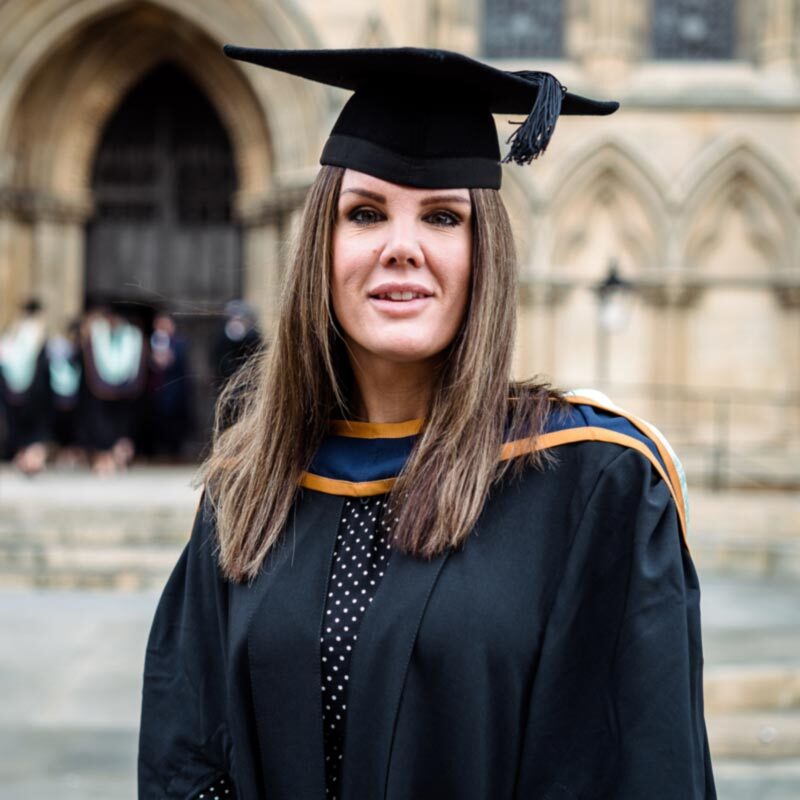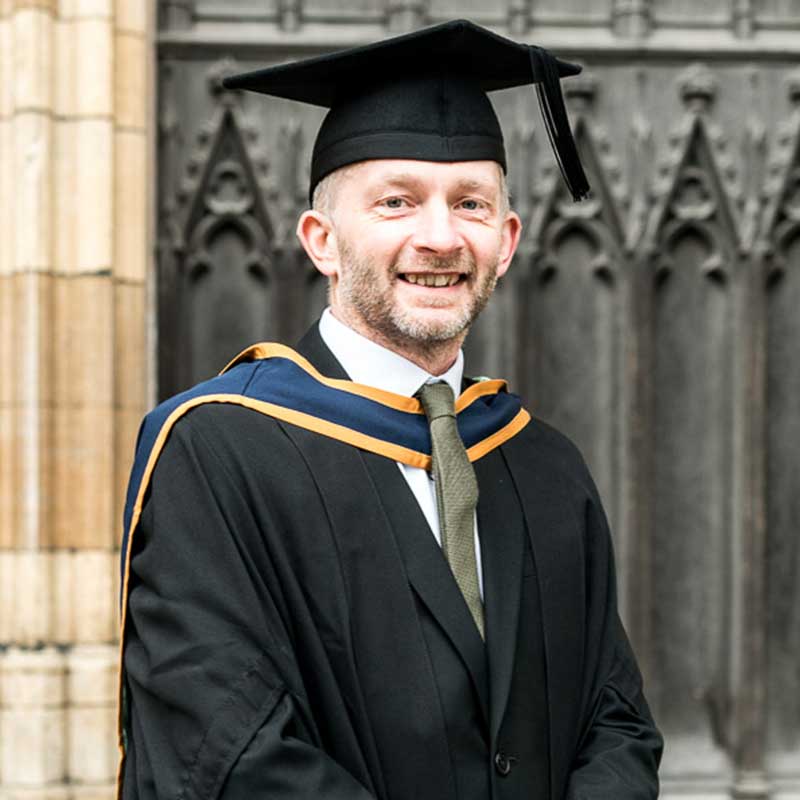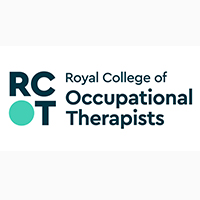Postgraduate Course
Occupational Therapy (Pre-Registration) MSc
Help people to do the things they want and need to in their daily lives, with our accredited Occupational Therapy MSc.
/prod01/yorksjacuk/media/content-assets/safe-images/header-images/OT-header-1-2003.jpg)
Occupational therapists support people to lead fulfilling lives. On this course you will learn how to work with people of all ages with physical, mental health and social difficulties. You will graduate ready to respond to the complex changes in health, social care and education, and able to seek opportunities for the future development of the profession.
Accredited by the Royal College of Occupational Therapists
York campus
- Duration – 2 years full time
- Start date – February 2026
- School – School of Science, Technology and Health
Minimum entry requirements
2:2 honours degree in a related subject
Interview You will need to attend an interview for this course
Tuition fees
UK 2025-26 £9,535 per year full time
International 2025-26 £18,400 per year full time
Course overview
This 2 year accelerated course will prepare you for a career as an occupational therapist. Our use of problem-based learning will support you to become an autonomous learner, global in your outlook, socially responsible and self aware. Upon completion you can seek professional registration. Both the Health and Care Professions Council (HCPC) and the Royal College of Occupational Therapists (RCOT) accredit this course.
As part of the course, you will:
- Undertake at least 1000 hours of varied clinical practice. These could include health, social care, education or third sector placements. A registered occupational therapist will supervise all clinical practice.
- Consider the complex relationships between occupation, health and wellbeing. You will learn to critique the application of occupational therapy practice models and occupational science.
- Develop the ability to carry out occupational therapy assessments and interventions. In doing so, you will enable people with a range of difficulties to fully engage in their everyday life.
Course structure
Year 1
You must study this postgraduate course full time. The course will take 2 years to complete.
In your first year you will study:
- 6 compulsory taught modules
- 2 clinical placements
You can find out which modules are available in each term in the Course Specifications.
Modules
Credits: 10
Compulsory module
On this module you will study key concepts, theories and skills that underpin an occupational perspective of humans and health. You will explore occupation, participation, health and wellbeing. You will also come to understand yourself as an "occupational being" and consider methods of understanding human experiences of occupation.
Credits: 20
Compulsory module
This module will introduce you to the theoretical and philosophical foundations of occupational therapy and the clinical processes used in practice.
Credits: 20
Compulsory module
This module will run over your two years of study and will help you to develop an appreciation of the importance of life long learning. It well help you to become a reflective practitioner with leadership skills. You will also develop a portfolio of evidence outlining your development and how you meet the professional standards.
Pass/fail
Compulsory module
This is your first 5 week placement working with a qualified occupational therapist in a practice setting. They will supervise and guide you in actively providing an occupational therapeutic service to clients, developing your professional team working skills.
Pass/fail
Compulsory module
During this second 7 week, practice-based module, you have the opportunity to practically apply the knowledge learned in the university based modules. You can further develop your occupational therapy practice and skills from your first placement.
Credits: 40
Compulsory module
On this module you will develop a critical approach to the application of evidence and theory in a range of professional practice contexts. You will learn to critique a range of practical skills required for practice.
Year 2
In your first year you will study:
- 5 compulsory taught modules
- 2 clinical placements
You can find out which modules are available in each term in the Course Specifications.
Modules
Credits: 20
Compulsory module
Gain an occupational perspective on participation with various groups and communities. Analyse current drivers and contextual influences on contemporary practice in a changing health and social care environment. You will also learn to demonstrate the potential for occupational therapy with groups and communities on a local, national and international scale.
Pass/fail
Compulsory module
This is an 8 week module in a contemporary setting. This might be:
- A new area for occupational therapy
- A management or leadership role
- A setting where there currently is no occupational therapy where you can identify the potential for future provision
You will be supervised by a qualified occupational therapist. Your objective is to plan and devise an appropriate product, which could be a single intervention, occupational assessment tool or a proposal for service development.
Credits: 40
Compulsory module
During this module, you will recognise the need for evidence-based practice, learn to undertake critical appraisal of evidence and become critical consumers and producers of research. In the first half of the module you will produce a research proposal which you will undertake in the second half.
Credits: 30
Compulsory module
In this module you will critically investigate how contemporary drivers, policy and legislation influence the provision of health, social care, and education. You will explore leadership and change management in the development of services.
Pass/fail
Compulsory module
This 8 week placement is your final, pre-graduation practice module, where you will work with professionals, clients and carers while carrying your own caseload. Your objective is to demonstrate that you can successfully apply the skills and knowledge learned throughout the course in a practice setting. You will show that you meet the required threshold to enter into an occupational therapy setting at a professional level.
Teaching and assessment
Teaching and learning
Your contact time will usually be 12 to 18 hours per week, between 9.00am and 8.00pm, Monday to Friday. This course will be delivered using problem-based learning (PBL), a philosophy and overarching approach to learning and teaching.
There will usually be a new problem to solve every 2 weeks. At the start and end of this period, you will take part in PBL tutorials. Your days will be a combination of 2 of the following:
- Independent study
- PBL tutorials
- Options and skills sessions
- Fixed resource sessions
Problem based learning sessions enable teaching staff to give continuous feedback related to your performance, execution of tasks and quality of the work produced.
Our teaching draws on both our research and professional experience. This means your learning is informed by the most current thinking in the subject area. You can find out more about our research and backgrounds by visiting our staff pages.
Assessment
You will undertake at least 1,000 hours of clinical practice in a variety of areas. These could include health, social care, education or third sector. A registered occupational therapist will supervise all clinical practice.
Assessment types vary from module to module. Some of your assessments might include:
- Portfolios
- Presentations
- Oral exams
- Research or service evaluation proposals
- Research articles
- Service evaluation reports
There will also be other assessments that do not count towards your final grade but are an important part of developing your work. For each assessment you will have the chance to talk to a tutor about your work before submission. Each assessment will be marked and returned with feedback so you can improve your academic writing.
Entry requirements
Qualifications
Minimum entry requirements
2:2 honours degree in a related subject
Interview You will need to attend an interview for this course
You would normally require a degree in a related subject of science, social sciences and/or healthcare and experience of undergraduate level research, including undertaking a project or dissertation. If you have an honours degree in a subject not covered above but related to occupational therapy, and are able to evidence significant academic or experience in health, social care and/or education, your application may still be considered.
If you have previously been enrolled in an Occupational Therapy Pre-registration degree or any other health professional education course you must submit a self declaration confirming that there are no previous fitness to practice concerns. This is a requirement of the Royal College of Occupational Therapists.
Additional requirements
Admission to the course is dependent upon the following selection processes and criteria:
- Personal statement
- Satisfactory DBS
- Medical report
- Declaration of any convictions, cautions or allegations
- Insight into the occupational therapy profession
- Evidence of study within the last 5 years
Interview
You will need to attend an interview for this course.
International students
If you are an international student you will need to show that your qualifications match our entry requirements.
Information about international qualifications and entry requirements can be found on our International pages.
If English is not your first language you will need to show that you have English Language competence at IELTS level 7.0 (with no skill below 6.5) or equivalent.
International entry requirements
Accreditation of Prior Experiential Learning (APEL)
If you can't meet these minimum requirements it may be possible to take into account evidence of Accreditation of Prior Experiential Learning (APEL) as an alternative method of meeting the programme’s entry requirements. In such a case, appropriate references and records of employment might be presented to support the applicant’s case for admission.
Terms and conditions
Our terms and conditions, policies and procedures contain important information about studying at York St John University. You can read them on our Admissions page.
Fees and funding
UK 2025 to 2026 entry
The tuition fee for this postgraduate course in the 2025 to 2026 academic year is £9,535 for full time study.
This cost applies to all UK, Jersey, Guernsey and Isle of Man students.
Funding your studies
If you live in England, you can use the same student loans system as undergraduate students to pay for this course.
When applying for funding, you will need to:
- Apply as an undergraduate student
- Find your course by searching MSc Occupational Therapy (Pre-Reg), SLC code 954411 when making your finance application.
If you live in Wales or Scotland, you will need to apply for a Postgraduate Master's Loan.
When applying for this type of funding you will need to:
- Apply as a postgraduate student
- Find your course by searching MSc Occupational Therapy (Pre-Reg), SLC code 954411 when making your finance application.
You can find out more about this loan and how to apply by following the link below to our funding opportunities page.
Tuition fees
UK 2025-26 £9,535 per year full time
International 2025-26 £18,400 per year full time
NHS Learning Support Fund
If you apply for this course, you might be eligible for additional financial support from the NHS. Visit their website to find out more about eligibility criteria and what you can receive.
International 2025 to 2026 entry
The tuition fee for this postgraduate course in the 2025 to 2026 academic year is £18,400 for full time study.
This price applies to all students living outside the UK.
Due to immigration laws, if you are an international student on a student visa, you must study full time. For more information about visa requirements and short-term study visas, please visit the International Visa and Immigration pages.
Find out more about funding your postgraduate studies.
Additional costs and financial support
Course-related costs
While studying for your degree, there may be additional costs related to your course. This may include purchasing personal equipment and stationery, books and optional field trips.
Accommodation and living costs
View our accommodation pages for detailed information on accommodation and living costs.
Career outcomes
Where could Occupational Therapy take you?
Successful graduates holding our Occupational Therapy (pre-registration) MSc qualification are entitled to apply for registration to practice and become practicing Occupational Therapists. This clinical skills developed on this course will give you an advantage in the health and social care industry. As a working professional, you may wish to further your development and become an advanced practitioner, specialising in a specific field of therapy.
Alumni stories
Visit our YSJ Snapshots blog to see what our past students from across the University have done with their York St John degrees.
Stand out from the crowd with postgraduate study.
Far fewer people have postgraduate degrees than undergraduate qualifications. This gives you something extra to set yourself apart in a competitive graduate job market.
Our careers service, LaunchPad, provides career support tailored to your ambitions. Through this service you can access:
- Employer events
- LinkedIn, CV and cover letter sessions
- Workshops on application writing and interview skills
- Work experience and volunteering opportunities
- Personalised career advice
This support does not end when you graduate. You can access our expert career advice for the rest of your life. We will help you gain the experience and confidence you need to succeed.
Student and alumni achievements
Laura Johnson, graduated 2019
Received the Early Researcher Prize from the Royal College of Occupational Therapists
Laura was drawn to Occupational Therapy while working in the care sector alongside an amazing Occupational Therapist who empowered people to live well with disability, following illness, or in old age. While studying at York St John University, Laura focused her MSc research on the ‘the dark side of occupation’. Laura realised that not only was there misunderstanding around this topic, but it also posed complex ethical questions for the profession. She hopes her research can further shine a light on the importance of occupational therapists being supported to work with a diverse range of people and their equally diverse occupations.
Jo Johnson, graduated 2018
Jointly authored a paper published in Research in Education
Jo worked alongside staff on a Student as Researcher’s project while studying for her Occupational Therapy MSc. As a result of this she has been published as a joint author of the article:
Vincent, J., Rowe, H., and Johnson, J. (2021) Parity of Participation for Autistic Students: Mapping Provision Across UK Higher Education Institutions. Research in Education.
Course highlights
Supportive staff recognised by students
We have previously been nominated in the Students' Union Awards. Our nominations included the Outstanding Inclusive Practice Award, Inspirational Staff Member, Outstanding Feedback Awards and Most Supportive Staff Member.
Conferences
Our students and staff attend international healthcare conferences. These are great opportunities to enter into a global network of occupational therapists.
Innovate and help people
While looking at existing healthcare practices, you have the opportunity to put forward alternative methods of care. These could lead to changes in the industry.

Julie Occupational Therapy
I’ve learnt so much about myself whilst studying Occupational Therapy here – juggling being a mother of two with a part time job, then writing essays, I seriously had to manage my time. The opportunities at York St John have been fantastic – I’m still in touch with my educators now. They gave me all the great feedback and support that ultimately got me through my degree and landed me in employment!

Jane-Mary Occupational Therapy
The best thing about the course was the amazing support I got from staff, especially being a mature student and not having been in study for a long time. I also loved that we were a small cohort on the course and we all become friends right from the beginning and we still keep in touch with each other.

Steve Occupational Therapy
The course has challenged my thinking and helped to shape my practice for the future. I have a health and social care background, and the course has given me the opportunity to reflect on good practice and share learning with others. As a mature student this course has been an opportunity to develop skills with others and challenge myself. There have been opportunities to get involved with mentoring, research, being a student representative, and preparing for a student conference. The placements have given me insight into the role and an opportunity to link theory with practice.


/prod01/yorksjacuk/media/content-assets/safe-images/1600-x-1200/OT-carousel.jpg)
/prod01/yorksjacuk/media/content-assets/safe-images/1600-x-1200/OccupationalTherapy_carousel3-1600x1200.jpg)
/prod01/yorksjacuk/media/content-assets/safe-images/1600-x-1200/OT-carousel-1.jpg)
/prod01/yorksjacuk/media/Humanities-1.jpg)
/prod01/yorksjacuk/media/content-assets/safe-images/500-x-500/POSTGRAD-PG-4.jpg)
/prod01/yorksjacuk/media/content-assets/safe-images/500-x-500/Campus-grounds---Lord-Mayors-Walk-7.jpg)
